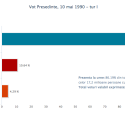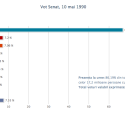IMPORTANT DEVELOPMENTS
- 1. LEGISLATION. The Parliament starts the procedures for amending the Constitution, in a consensual manner, starting from the suggestions of the civil society
- 2. ECONOMY. Romania’s macro-economic trust ratings reach the highest level in 12 months
- 3. INVESTMENTS. 2013 will see Romania attracting investments worth 3.8 billion Euros, creating 20,000 jobs
- 4. GOVERNMENT. The Government will set a ceiling for the wages of the executive leadership of state-owned companies
- 5. LEGISLATION. The Parliament amends the provisions concerning the turnout thresholds for referenda
1. The process of amending the Constitution continues
The Constitutional Forum will present the Parliament with the legislative proposals concerning the amendment of the Constitution, following the civil society debates concerning this topic. On the 29th of May, the Parliamentary Commission for amending the Constitution will start its work, so that the referendum approving the final form of the legislation will be held by the end of the year.
Given that the new Multiannual Financial Mechanism will start on January 1, 2013, Romania needs the new regional administration level to start functioning by the end of the year. This process is not possible, unless the current provisions of the Constitution, which do not encompass a regional governance level, are amended. Government spokesmen have emphasized that setting-up a regional administrative level, based upon the principle of subsidiarity, is needed in order to improve the European funding absorption rate.
At the same time, there are several provisions within the current framework of the Constitution that stand at the root of the political crises that have occurred over the past decade. Romania needs clearer Constitutional provisions and clear demarcation lines between the prerogatives of the Executive and Legislative branches, on the one hand, and between the Prime Minister’s Office and the Presidential Institution, on the other hand. Moreover, amendments need to make it harder for politicians to abuse the prerogatives of their office.
The USL wants a modern and European Constitution. To that end, the coalition has enlisted the help of the Venice Commission, which will guarantee that the amending process will proceed while following the highest democratic standards. USL parliamentary leaders have declared on several occasions that the Constitution is not the expression of the USL’s proposals, but the result of a consensual consultation and dialogue process, that encompasses the opinions voiced by all political forces and by civil society actors. Moreover, USL MPs have emphasized that the starting point of the parliamentary debates is the document issued by the Constitutional Forum, a structure that brought together the most relevant Romanian NGOs and civil society actors.
2. The macroeconomic trust index of Romania reaches its highest level in 12 months
The trust of financial analysts in the state of the Romanian economy has risen, in April, to the highest level of the last 12 months. The steady rise of the index is the result of the increasingly optimistic expectations regarding the near future of the Romanian economy, as well as of the positive evaluations of the business environment and labor market conditions.
The macroeconomic trust ratings of Romania have risen from 33.8 points in March to 44 points in April. The foreign markets’ perception of Romania has continuously improved over the last year, due to positive signals regarding the economy’s recovery, the performance of the export sector, the current account positive balance and the budgetary deficit reduction. The interest rates for Romania’s bonds have decreased significantly, dropping from 7% (in early 2012) to 5% at the moment. Romania has already reduced its budgetary deficit below the 3% threshold, while increasing the public sector wages and pensions.
Government figures have emphasized that austerity is not the solution for overcoming the effects of the economic crisis. The Prime Minister argued that ensuring a sustainable rate of economic growth, alongside stimulating domestic demand and creating jobs are the real solutions to Romania’s economic problems.
3. Foreign investments underline Romania’s political and economic stability
The representatives of the Daimler Company and the acting minister for great projects have signed the agreement by which the auto company will invest 300 million Euros in Romania. Romania is expected to receive 3.8 billion Euros in foreign direct investments, which will help create 20,000 jobs.
The economic and political stability offered by the USL government, as well as the measures enacted insofar are starting to generate positive effects. Investors have increased confidence that Romania is a safe and profitable destination for their projects.
The Daimler investment is only a single step of a government strategy meant to create conditions for economic growth and jobs. The investment joins other undergoing projects of high-profile companies such as OMV, Huadian Engineering, Holzindustrie Schweighofer, Bosch, Fribourg Development, Promocion Inversolar 65 or DeLonghi.
4. The Government will limit the wages of the executive leadership of state-owned companies
The Government has adopted the Government Emergency Ordinance that will set a ceiling for the wages of the Executive leadership of state-owned companies, based on a Polish model. The Ordinance proceedings apply not only to the members of the executive leadership, but also to the general managers.
Wages cannot be bigger than 6 times the average wage in that particular branch of activity. Wages hoigher than this threshold will be lowered to this level. All future contracts have to abide by these rules. State companies managers will receive performance-related bonuses.
The Government also intends to overtax by 85% the compensatory wages laid-off managers are to receive. This provisions apply only to the wages higher than the legal ceiling.
5. The Parliament has changed the provisions regarding the referenda turnout threshold
The Chamber of Deputies has approved the legal initiative amending the Law concerning the organization of referenda. In line with the Venice Commission’s position, the initiative lowers the turnout threshold for the validation of future referenda.
The new provisions set out two conditions for the validation of a referendum: at least 30% of the citizens enrolled in the Electoral Register need to vote in the referendum and at least 25% of the voting citizens need to approve the proposal in order for it to be approved.
During the last couple of years, turnout reached around 50% of the electorally registered citizens, which means that decisions were approved by roughly 25% of the total number of potential voters.
The amendments were adopted given the increasing lack of interest for the political dynamics and in order to facilitate the adoption of major legal initiatives, such as the amendment of the Constitution and the organization of a regional level of governance. Moreover, the amendments will prevent boycott voting tactics, such as the ones applied in 2012, when the vote of 7.4 million citizens was disregarded due to the low turnout of PDL voters.









